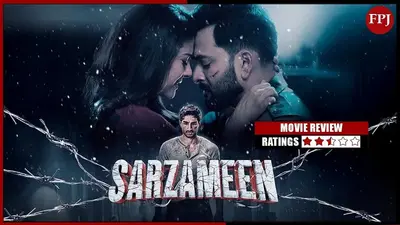Title: Sarzameen
Director: Kayoze Irani
Cast: Prithviraj Sukumaran, Kajol, Ibrahim Ali Khan, Boman Irani
Where: Streaming on JioHotStar
Rating: **1/2 Stars
In the grand tradition of cinematic tightropes where nationalism tangoes with familial melodrama, Sarzameen arrives dressed in all the right uniforms—boots polished, flag fluttering, glycerine teardrops in tow. Unfortunately, somewhere between the border skirmishes and dining table tensions, it loses its footing.
Opening with the narrative equivalent of a salute—stiff, ceremonial, and decidedly impersonal—the film quickly redeems itself with an impressively mounted action sequence featuring Colonel Vijay Menon (Prithviraj Sukumaran) storming a terrorist den. It’s an adrenaline-charged tableau that promises to set the story rolling on a high note. Alas, promises—like peace accords in the Valley—are fragile.
What follows is a tale stitched with old-school patriotism and fraying emotional clichés. When Colonel Vijay, facing his son’s abduction, declares, “Mere liye hamesha sabse aage desh,” it’s meant to be noble—but becomes a chilling tool when terrorists use the taped line to radicalise his son. Balancing this stern nationalism is Mehek (Kajol), the quietly grieving mother, whose emotional ballast arrives in flashback, gently reminding her son, “Iss duniya mein apno ka khoon se badhkar kuch nahi hai.” The line is sincere, her delivery heartfelt—but what should feel nuanced instead lands like a bumper sticker, lacking the weight of genuine, lived-in emotion.
Eight years and a conveniently unresolved tragedy later, the son returns—rebellious, radicalised, and suffering from a bad case of Stockholm syndrome. Ibrahim Ali Khan gives it his all, stammering and emoting with sincerity. But his character design—a stuttering, nervous boy—and his arc are more flatline than evolution, straitjacketed by lazy, cliched writing from not one but four writers. Despite his efforts, he’s left grasping for depth in a script that offers little more than motivational-poster dialogue and a reheated sense of rebellion.
Kajol, ever the luminous screen presence, anchors the emotional weight of the film with the kind of grace that comes from having done this many times before. Her silences speak more than her lines, but by the final act, even she can’t salvage the nosedive the narrative takes. Prithviraj, ever dependable, shoulders his role with stoic sincerity, but his character is a sketch—a patriotic caricature with limited shading. Boman Irani pops in for a guest appearance and exits before you can even decide if he’s meant to be pivotal or ornamental.
Nikita Roy Review: Sonakshi Sinha And Arjun Rampal’s Film Delivers All Atmosphere, Little Aftershock
Visually, the film paints Kashmir in wintery hues. Kamaljeet Negi’s cinematography is pretty but far from groundbreaking. We’ve seen these frames before, and the film knows it. Vishal Khurana’s score gallops along like it’s late for a war parade, leaving subtlety behind. The songs, however, do manage to tug at a few well-worn heartstrings.
